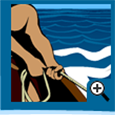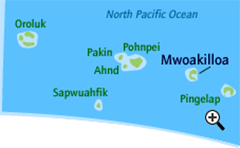The Canoe Is the People
Indigenous Navigation in the Pacific
Pacific Accounts
Many stories tell about the beginning of places and people. Like the archaeological account, many stories talk about flooding or lost lands… or islands being fished up from the sea. Others talk about canoe voyages from faraway places. Still others tell about people using spiritual powers to create new lands.
In Aotearoa GLOSSARY Aotearoa - New Zealand (New Zealand) alone, a range of stories is told. As in many Polynesian islands, there is the story of the boy Maui. From his canoe (Te Waka a Maui, the South Island), Maui fished up the North Island (Te Ika a Maui). There is the story of the navigator Kupe, who landed on the northwest shores. There are the stories of the canoes that navigated here from the island homeland of Hawaiki. And there’s the story of Paikea, who arrived on the east coast of the North Island on the back of a whale.
Click on the stories to find out more...
When Ka pulled and island from the ocean
Mwoakilloa, Micronesia
There were once three brothers named Ur (the oldest), Mwa, and Ka (the youngest). As they grew, their parents taught them many skills – to farm, build canoes, and fish. Ka was the best farmer but the worst fisherman. One day, Ka’s hook got caught, and he couldn’t free it. As usual, his brothers made fun of him. But Ka pulled hard, and finally he pulled an island to the surface. It had three islets.
Ka said he would only give his brothers some land if they showed him the secrets of fishing. They wanted land badly, so they agreed, and Ka learned to fish. Ka then gave them the islets with the best fishing areas – because they were the best fishermen. He kept the islet that had good land for farming. The brothers named their islands after themselves: Urak, Mwandohn, and Kahlap.
When their mother died, a coconut tree grew from her grave. The nuts had three corners, which they named Ur, Mwa, and Ka. They planted them on each islet, where they still grow today. Because of the names of the brothers, the word for young coconut became urmwaka.
In other versions of this story, Mwoakilloa is called Mokil.
























